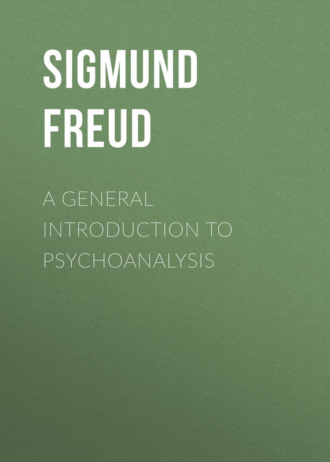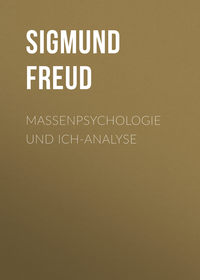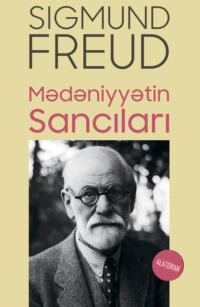 полная версия
полная версияA General Introduction to Psychoanalysis
If we transfer our conception from a single element to the entire dream, we find that the dream as a whole is a distorted substitute for something else, something unconscious. To discover this unconscious thing is the task of dream interpretation. From this, three important rules, which we must observe in the work of dream interpretation, are straightway derived:
1. What the dream seems to say, whether it be sensible or absurd, clear or confused is not our concern, since it can under no condition be that unconscious content we are seeking. Later we shall have to observe an obvious limitation of this rule. 2. The awakening of substitute formations for each element shall be the sole object of our work. We shall not reflect on these, test their suitability or trouble how far they lead away from the element of the dream. 3. We shall wait until the hidden unconscious we are seeking appears of itself, as the missing word Monaco in the experiment which we have described.
Now we can understand, too, how unimportant it is how much, how little, above all, how accurately or how indifferently the dream is remembered. For the dream which is remembered is not the real one, but a distorted substitute, which is to help us approach the real dream by awakening other substitute formations and by making the unconscious in the dream conscious. Therefore if our recollection of the dream was faulty, it has simply brought about a further distortion of this substitute, a distortion which cannot, however, be unmotivated.
One can interpret one's own dreams as well as those of others. One learns even more from these, for the process yields more proof. If we try this, we observe that something impedes the work. Haphazard ideas arise, but we do not let them have their way. Tendencies to test and to choose make themselves felt. As an idea occurs, we say to ourselves "No, that does not fit, that does not belong here"; of a second "that is too senseless"; of a third, "this is entirely beside the point"; and one can easily observe how the ideas are stifled and suppressed by these objections, even before they have become entirely clear. On the one hand, therefore, too much importance is attached to the dream elements themselves; on the other, the result of free association is vitiated by the process of selection. If you are not interpreting the dream alone, if you allow someone else to interpret it for you, you will soon discover another motive which induces you to make this forbidden choice. At times you say to yourself, "No, this idea is too unpleasant, I either will not or cannot divulge this."
Clearly these objections are a menace to the success of our work. We must guard against them, in our own case by the firm resolve not to give way to them; and in the interpretation of the dreams of others by making the hard and fast rule for them, never to omit any idea from their account, even if one of the following four objections should arise: that is, if it should seem too unimportant, absurd, too irrelevant or too embarrassing to relate. The dreamer promises to obey this rule, but it is annoying to see how poorly he keeps his promise at times. At first we account for this by supposing that in spite of the authoritative assurance which has been given to the dreamer, he is not impressed with the importance of free association, and plan perhaps to win his theoretic approval by giving him papers to read or by sending him to lectures which are to make him a disciple of our views concerning free association. But we are deterred from such blunders by the observation that, in one's own case, where convictions may certainly be trusted, the same critical objections arise against certain ideas, and can only be suppressed subsequently, upon second thought, as it were.
Instead of becoming vexed at the disobedience of the dreamer, these experiences can be turned to account in teaching something new, something which is the more important the less we are prepared for it. We understand that the task of interpreting dreams is carried on against a certain resistance which manifests itself by these critical objections. This resistance is independent of the theoretical conviction of the dreamer. Even more is apparent. We discover that such a critical objection is never justified. On the contrary, those ideas which we are so anxious to suppress, prove without exception to be the most important, the most decisive, in the search for the unconscious. It is even a mark of distinction if an idea is accompanied by such an objection.
This resistance is something entirely new, a phenomenon which we have found as a result of our hypotheses although it was not originally included in them. We are not too pleasantly surprised by this new factor in our problem. We suspect that it will not make our work any easier. It might even tempt us to abandon our entire work in connection with the dream. Such an unimportant thing as the dream and in addition such difficulties instead of a smooth technique! But from another point of view, these same difficulties may prove fascinating, and suggest that the work is worth the trouble. Whenever we try to penetrate to the hidden unconscious, starting out from the substitute which the dream element represents, we meet with resistance. Hence, we are justified in supposing that something of weight must be hidden behind the substitute. What other reason could there be for the difficulties which are maintained for purposes of concealment? If a child does not want to open his clenched fist, he is certainly hiding something he ought not to have.
Just as soon as we bring the dynamic representation of resistance into our consideration of the case, we must realize that this factor is something quantitatively variable. There may be greater or lesser resistances and we are prepared to see these differences in the course of our work. We may perhaps connect this with another experience found in the work of dream interpretation. For sometimes only one or two ideas serve to carry us from the dream element to its unconscious aspect, while at other times long chains of associations and the suppression of many critical objections are necessary. We shall note that these variations are connected with the variable force of resistance. This observation is probably correct. If resistance is slight, then the substitute is not far removed from the unconscious, but strong resistance carries with it a great distortion of the unconscious and in addition a long journey back to it.
Perhaps the time has come to take a dream and try out our method to see if our faith in it shall be confirmed. But which dream shall we choose? You cannot imagine how hard it is for me to decide, and at this point I cannot explain the source of the difficulty. Of course, there must be dreams which, as a whole, have suffered slight distortion, and it would be best to start with one of these. But which dreams are the least distorted? Those which are sensible and not confused, of which I have already given you two examples? This would be a gross misunderstanding. Testing shows that these dreams have suffered by distortion to an exceptionally high degree. But if I take the first best dream, regardless of certain necessary conditions, you would probably be very much disappointed. Perhaps we should have to note such an abundance of ideas in connection with single elements of dream that it would be absolutely impossible to review the work in perspective. If we write the dream out and confront it with the written account of all the ideas which arise in connection with it, these may easily amount to a reiteration of the text of the dream. It would therefore seem most practical to choose for analysis several short dreams of which each one can at least reveal or confirm something. This is what we shall decide upon, provided experience should not point out where we shall really find slightly distorted dreams.
But I know of another way to simplify matters, one which, moreover, lies in our path. Instead of attempting the interpretation of entire dreams, we shall limit ourselves to single dream elements and by observing a series of examples we shall see how these are explained by the application of our method.
1. A lady relates that as a child she often dreamt "that God had a pointed paper hat on his head." How do you expect to understand that without the help of the dreamer? Why, it sounds quite absurd. It is no longer absurd when the lady testifies that as a child she was frequently made to wear such a hat at the table, because she could not help stealing glances at the plates of her brothers and sisters to see if one of them had gotten more than she. The hat was therefore supposed to act as a sort of blinder. This explanation was moreover historic, and given without the least difficulty. The meaning of this fragment and of the whole brief dream, is clear with the help of a further idea of the dreamer. "Since I had heard that God was all-knowing and all-seeing," she said, "the dream can only mean that I know everything and see everything just as God does, even when they try to prevent me." This example is perhaps too simple.
2. A sceptical patient has a longer dream, in which certain people happen to tell her about my book concerning laughter and praise it highly. Then something is mentioned about a certain "'canal,' perhaps another book in which 'canal' occurs, or something else with the word 'canal' … she doesn't know … it is all confused."
Now you will be inclined to think that the element "canal" will evade interpretation because it is so vague. You are right as to the supposed difficulty, but it is not difficult because it is vague, but rather it is vague for a different reason, the same reason which also makes the interpretation difficult. The dreamer can think of nothing concerning the word canal, I naturally can think of nothing. A little while later, as a matter of fact on the next day, she tells me that something occurred to her that may perhaps be related to it, a joke that she has heard. On a ship between Dover and Calais a well-known author is conversing with an Englishman, who quoted the following proverb in a certain connection: "Du sublime au ridicule, il n'y a qu'un pas."24 The author answers, "Oui, le pas de Calais,"25 with which he wishes to say that he finds France sublime and England ridiculous. But the "Pas de Calais" is really a canal, namely, the English Channel. Do I think that this idea has anything to do with the dream? Certainly, I believe that it really gives the solution to the puzzling dream fragments. Or can you doubt that this joke was already present in the dream, as the unconscious factor of the element, "canal." Can you take it for granted that it was subsequently added to it? The idea testifies to the scepticism which is concealed behind her obtrusive admiration, and the resistance is probably the common reason for both phenomena, for the fact that the idea came so hesitatingly and that the decisive element of the dream turned out to be so vague. Kindly observe at this point the relation of the dream element to its unconscious factor. It is like a small part of the unconscious, like an allusion to it; through its isolation it became quite unintelligible.
3. A patient dreams, in the course of a longer dream: "Around a table of peculiar shape several members of his family are sitting, etc." In connection with this table, it occurs to him that he saw such a piece of furniture during a visit to a certain family. Then his thoughts continue: In this family a peculiar relation had existed between father and son, and soon he adds to this that as a matter of fact the same relation exists between himself and his father. The table is therefore taken up into the dream to designate this parallel.
This dreamer had for a long time been familiar with the claims of dream interpretation. Otherwise he might have taken exception to the fact that so trivial a detail as the shape of a table should be taken as the basis of the investigation. As a matter of fact we judge nothing in the dream as accidental or indifferent, and we expect to reach our conclusion by the explanation of just such trivial and unmotivated details. Perhaps you will be surprised that the dream work should arouse the thought "we are in exactly the same position as they are," just by the choice of the table. But even this becomes clear when you learn that the name of the family in question is Tischler. By permitting his own family to sit at such a table, he intends to express that they too are Tischler. Please note how, in relating such a dream interpretation, one must of necessity become indiscreet. Here you have arrived at one of the difficulties in the choice of examples that I indicated before. I could easily have substituted another example for this one, but would probably have avoided this indiscretion at the cost of committing another one in its place.
The time has come to introduce two new terms, which we could have used long ago. We shall call that which the dream relates, the manifest content of the dream; that which is hidden, which we can only reach by the analysis of ideas we shall call latent dream thoughts. We may now consider the connection between the manifest dream content and the latent dream thoughts as they are revealed in these examples. Many different connections can exist. In examples 1 and 2 the manifest content is also a constituent part of the latent thought, but only a very small part of it. A small piece of a great composite psychic structure in the unconscious dream thought has penetrated into the manifest dream, like a fragment of it, or in other cases, like an allusion to it, like a catchword or an abbreviation in the telegraphic code. The interpretation must mould this fragment, or indication, into a whole, as was done most successfully in example 2. One sort of distortion of which the dream mechanism consists is therefore substitution by means of a fragment or an allusion. In the third, moreover, we must recognize another relation which we shall see more clearly and distinctly expressed in the following examples:
4. The dreamer "pulls a certain woman of his acquaintance from behind a bed." He finds the meaning of this dream element himself by his first association. It means: This woman "has a pull" with him.26
5. Another man dreams that "his brother is in a closet." The first association substitutes clothes-press for closet, and the second gives the meaning: his brother is close-pressed for money.27
6. The dreamer "climbs a mountain from the top of which he has an extraordinarily distant view." This sounds quite sensible; perhaps there is nothing about it that needs interpretation, and it is simply necessary to find out which reminiscence this dream touches upon and why it was recalled. But you are mistaken; it is evident that this dream requires interpretation as well as any other which is confused. For no previous mountain climbing of his own occurs to the dreamer, but he remembers that an acquaintance of his is publishing a "Rundschau," which deals with our relation to the furthermost parts of the earth. The latent dream thought is therefore in this case an identification of the dreamer with the "Rundschauer."
Here you find a new type of connection between the manifest content and the latent dream element. The former is not so much a distortion of the latter as a representation of it, a plastic concrete perversion that is based on the sound of the word. However, it is for this very reason again a distortion, for we have long ago forgotten from which concrete picture the word has arisen, and therefore do not recognize it by the image which is substituted for it. If you consider that the manifest dream consists most often of visual images, and less frequently of thoughts and words, you can imagine that a very particular significance in dream formation is attached to this sort of relation. You can also see that in this manner it becomes possible to create substitute formations for a great number of abstract thoughts in the manifest dream, substitutions that serve the purpose of further concealment all the same. This is the technique of our picture puzzle. What the origin is of the semblance of wit which accompanies such representations is a particular question which we need not touch upon at this time.
A fourth type of relation between the manifest and the latent dream cannot be dealt with until its cue in the technique has been given. Even then I shall not have given you a complete enumeration, but it will be sufficient for our purpose.
Have you the courage to venture upon the interpretation of an entire dream? Let us see if we are well enough equipped for this undertaking. Of course, I shall not choose one of the most obscure, but one nevertheless that shows in clear outline the general characteristics of a dream.
A young woman who has been married for many years dreams: "She is sitting in the theatre with her husband; one side of the orchestra is entirely unoccupied. Her husband tells her that Elise L. and her bridegroom had also wished to come, but had only been able to procure poor seats, three for 1 Fl., 50 Kr. and those of course they could not take. She thinks this is no misfortune for them."
The first thing that the dreamer has to testify is that the occasion for the dream is touched upon in its manifest content. Her husband had really told her that Elise L., an acquaintance of about her age, had become engaged. The dream is the reaction to this news. We already know that in the case of many dreams it is easy to trace such a cause to the preceding day, and that the dreamer often gives these deductions without any difficulty. The dreamer also places at our disposal further information for other parts of the manifest dream content. Whence the detail that one side of the orchestra is unoccupied? It is an allusion to an actual occurrence of the previous week. She had made up her mind to go to a certain performance and had procured tickets in advance, so much in advance that she had been forced to pay a preference tax.28 When she arrived at the theatre, she saw how needless had been her anxiety, for one side of the orchestra was almost empty. She could have bought the tickets on the day of the performance itself. Her husband would not stop teasing her about her excessive haste. Whence the 1 Fl. 50 Kr.? From a very different connection that has nothing to do with the former, but which also alludes to an occurrence of the previous day. Her sister-in-law had received 150 florins as a present from her husband, and knew no better, the poor goose, than to hasten to the jeweler and spend the money on a piece of jewelry. Whence the number 3? She can think of nothing in connection with this unless one stresses the association that the bride, Elise L., is only three months younger than she herself, who has been married for almost ten years. And the absurdity of buying three tickets for two people? She says nothing of this, and indeed denies all further associations or information.
But she has given us so much material in her few associations, that it becomes possible to derive the latent dream thought from it. It must strike us that in her remarks concerning the dream, time elements which constitute a common element in the various parts of this material appear at several points. She attended to the tickets too soon, took them too hastily, so that she had to pay more than usual for them; her sister-in-law likewise hastened to carry her money to the jeweler's to buy a piece of jewelry, just as if she might miss it. Let us add to the expressions "too early," "precipitately," which are emphasized so strongly, the occasion for the dream, namely, that her friend only three months younger than herself had even now gotten a good husband, and the criticism expressed in the condemnation of her sister-in-law, that it was foolish to hurry so. Then the following construction of the latent dream thought, for which the manifest dream is a badly distorted substitute, comes to us almost spontaneously:
"How foolish it was of me to hurry so in marrying! Elise's example shows me that I could have gotten a husband later too." (The precipitateness is represented by her own behavior in buying the tickets, and that of her sister-in-law in purchasing jewelry. Going to the theatre was substituted for getting married. This appears to have been the main thought; and perhaps we may continue, though with less certainty, because the analysis in these parts is not supported by statements of the dreamer.) "And I would have gotten 100 times as much for my money." (150 Fl. is 100 times as much as 1 Fl. 50 Kr.). If we might substitute the dowry for the money, then it would mean that one buys a husband with a dowry; the jewelry as well as the poor seats would represent the husband. It would be even more desirable if the fragment "3 seats" had something to do with a husband. But our understanding does not penetrate so far. We have only guessed that the dream expresses her disparagement of her own husband, and her regret at having married so early.
It is my opinion that we are more surprised and confused than satisfied by the result of this first dream interpretation. We are swamped by more impressions than we can master. We see that the teachings of dream interpretation are not easily exhausted. Let us hasten to select those points that we recognize as giving us new, sound insight.
In the first place, it is remarkable that in the latent thought the main emphasis falls on the element of haste; in the manifest dream there is absolutely no mention of this to be found. Without the analysis we should not have had any idea that this element was of any importance at all. So it seems possible that just the main thing, the central point of the unconscious thoughts, may be absent in the manifest dream. Because of this, the original impression in the dream must of necessity be entirely changed. Secondly: In the dream there is a senseless combination, 3 for 1 Fl. 50 Kr.; in the dream thought we divine the sentence, "It was senseless (to marry so early)." Can one deny that this thought, "It was senseless," was represented in the manifest dream by the introduction of an absurd element? Thirdly: Comparison will show that the relation between the manifest and latent elements is not simple, certainly not of such a sort that a manifest element is always substituted for the latent. There must rather be a quantitative relationship between the two groups, according to which a manifest element may represent several latent ones, or a latent element represented by several manifest elements.
Much that is surprising might also be said of the sense of the dream and the dreamer's reaction to it. She acknowledges the interpretation but wonders at it. She did not know that she disparaged her husband so, and she did not know why she should disparage him to such a degree. There is still much that is incomprehensible. I really believe that we are not yet fully equipped for dream interpretation, and that we must first receive further instruction and preparation.
EIGHTH LECTURE
THE DREAM
Dreams of ChildhoodWE think we have advanced too rapidly. Let us go back a little. Before our last attempt to overcome the difficulties of dream distortion through our technique, we had decided that it would be best to avoid them by limiting ourselves only to those dreams in which distortion is either entirely absent or of trifling importance, if there are such. But here again we digress from the history of the evolution of our knowledge, for as a matter of fact we become aware of dreams entirely free of distortion only after the consistent application of our method of interpretation and after complete analysis of the distorted dream.
The dreams we are looking for are found in children. They are short, clear, coherent, easy to understand, unambiguous, and yet unquestionable dreams. But do not think that all children's dreams are like this. Dream distortion makes its appearance very early in childhood, and dreams of children from five to eight years of age have been recorded that showed all the characteristics of later dreams. But if you will limit yourselves to the age beginning with conscious psychic activity, up to the fourth or fifth year, you will discover a series of dreams that are of a so-called infantile character. In a later period of childhood you will be able to find some dreams of this nature occasionally. Even among adults, dreams that closely resemble the typically infantile ones occur under certain conditions.









